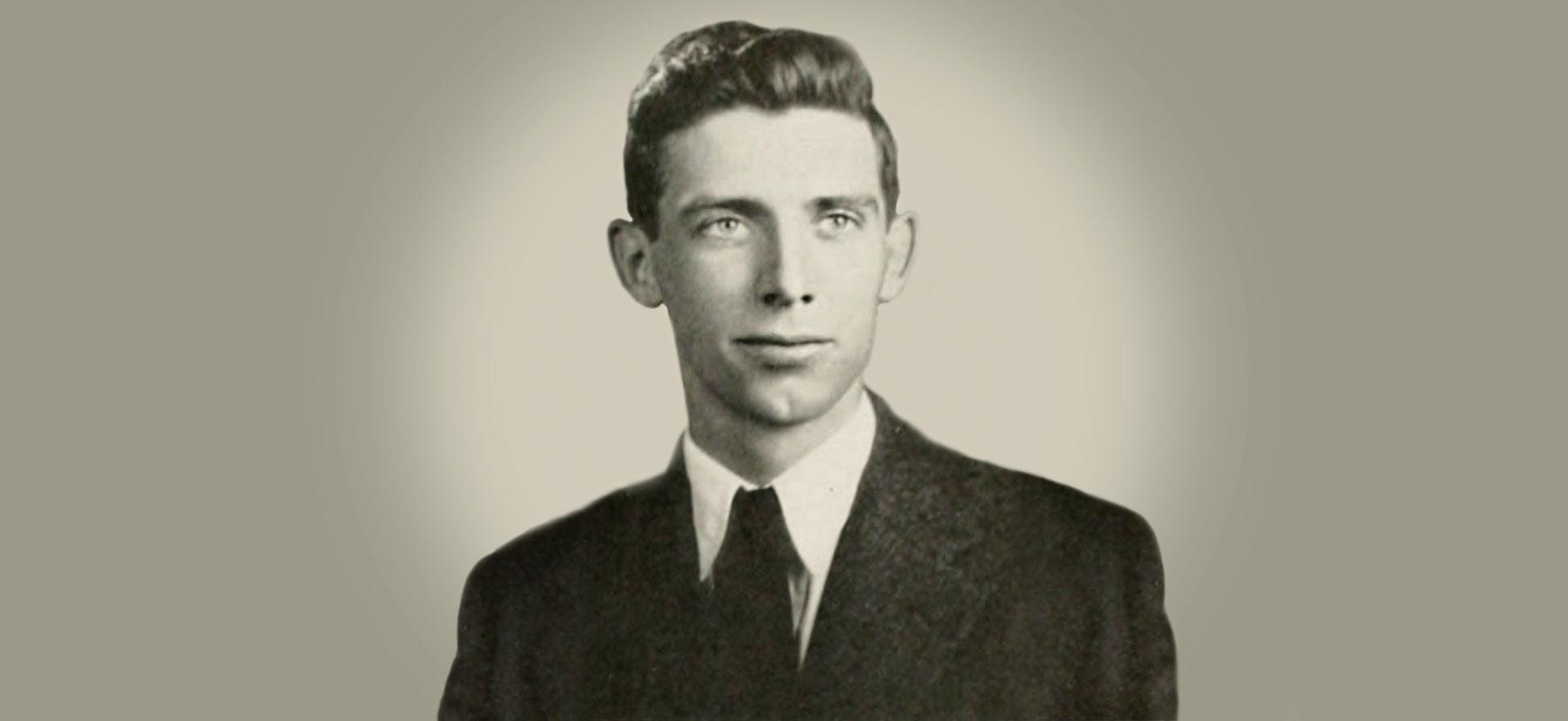J. Morris Evans

J. Morris "Morrie" Evans (1921-2017) was a member of Haverford College's class of 1943. He donated the entirety of the Cope Evans Family Papers to Haverford College Quaker & Special Collections. The collection is comprised primarily of letters but also includes diaries and financial documents. 5008 items from the collection are available digitally. The digitization and cataloging process was funded by the J. Morris and Anne T. Evans Fund.
In the Record of the Class of 1943, the Haverford College yearbook, Evans is described as "our one real athlete" by his peers because of the number of varsity sports he participated in. He played soccer, basketball, and ran track. His peers described him as a clever man, and it was perhaps this same cleverness that aided him in his business career.
Evans married Anne Tall a year after graduating from Haverford. They were married until her death in 2012. Evans was a conscientious objector during World War II. He worked on farms as alternative service. After the war, he began work as an accountant at the Philadelphia Quartz company which later became the PQ corporation. J. Morris Evans was subsequently Vice-President and Treasurer of the Corporation.
In his free time, Evans compiled documents concerning previous generations of the Cope Evans family. In addition, he carefully managed the documents he and his family produced during his lifetime including photographs and letters. He compiled more than 5000 documents (letters, records and diaries) spanning 1683 to 2012. He wrote a biography of Thomas Pim Cope around 2002 which he distributed amongst family. The biography and J. Morris Evans' notes are available in the physical collection. Scraps of Evans' notes can be found in Haverford's digital collections, such as this page which contains excerpts from Thomas Pim Cope's journals where he talks about the ship "Rebecca.". There are several such excerpts with notes about a variety of ships. In this letter, Evans briefly discusses the book with relatives who expressed interest in it.
Evans' hobby was a social one. Upon finding a transcript of the "Echoes of the Cope Evans Christmas Dinner," a family dinner which took place at Sylvia and Harold Evans' home, he made a point of drawing Sylvia Evans' attention to it as evidenced in her letter of thanks to him. The transcript records 25 sets of verses, each describing a particular person present at the dinner; a different item was awarded to each person described in one of the sets. Sylvia Evans appreciated the memories the transcript brought back for her. She also told Evans of her interest in Johnathan Evans, likely expecting him to have the knowledge to point her to the relevant resources. J. Morris Evans was invaluable when his friends and colleagues had questions concerning the Cope Evans history.
J. Morris Evans actively managed the materials . He would pass along pieces when people requested them from him. In this letter, he urges William Elkinton Evans to return a batch of family letters because they'll likely be requested by someone else. The letter suggests that people would borrow items from Evans for projects. This is an example of how Evans would support scholarship. Also, Evans says here that sharing family mementos with extended family brings him joy.
Evans kept 96 letters that he or his wife wrote to his mother. It is common for these letters to appear on what seems to be Mrs. Evans' stationery. In his letters, Evans would keep his mother informed of his family's excursions and general welfare. This letter, in which Evans details the family's vacation stay near a beach, is an example. Other family correspondence includes postcards from his parents as they stayed in places defined by their natural beauty such as Yosemite natural park.
Evans generously donated to the Haverford Libraries in a myriad ways. He supported Haverford College Digital Scholarship Projects like "Who Killed Sarah Stout?" He funded the project which involved developing a clue-based game in which players try to piece together the cause of Quaker Sarah Stout's mysterious death. The J. Morris and Anne T. Evans Fund has also supported the digitization of Quaker materials, and has been instrumental in the development of various digital projects.
The majority of his donations concern the Cope Evans family experience across centuries, but a subset of the collection is composed of papers he collected throughout his life. The documents concerning Evans' own life go as far back as 1930, when Evans would have been eight or nine years of age. In this letter he wishes his grandmother happy birthday and tells her about a boy named Francis capsizing in a pond. The fact that he retained a document from so early on in his life shows the care with which Evans archived.
Haverford College, Haverford College Libraries, and a number of scholars have greatly benefited from the efforts of J. Morris Evans.